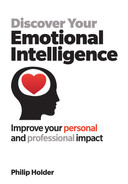Agent
The individual or group of people who undertake the task of initiating and managing change in an organisation is known as a change agent. A change agent, through their preference of outward curiosity, identifies the potential solution or opportunity, as well as how to incorporate them effectively into existing frameworks.
One of the biggest challenges in organisations of any type is recognising potential growth opportunities and then bringing those opportunities to fruition through demonstrating flexibility and resilience across their existing and potential markets.
As change agents, we need to adopt the curious mindset required to identify these potential opportunities in the first place, and then adjust our EI to reflect the same level of flexibility and resilience in determining the benefits to the organisation and the people involved.
The same level of EI will be required to ensure that our focus remains equally balanced between bottom-line profit and the necessary human endeavour needed to meet it.
Change agents are never happy with here and now, they are always curious about how things work and, indeed, how they might be improved or done entirely differently.
Curiosity is a component link between the cognitive and the EI part of the brain. It primes the mind ready for learning new things.
When we become curious, we are using a lot more than just a single neural pathway. We are using all our stored subconscious data to make sense of the situation.
We then rationalise that data using our emotional perspective, which may be influenced by our visual, auditory, and even our kinaesthetic signal processing.
At the same time, our cognitive mind is trying to make sense of the situation and then come up with alternative solutions.
Curiosity is a shared process across almost all living entities on our planet. Curiosity keeps us safe and it also evolves and develops our species. The more curious we become, the faster we can adapt, grow and develop.
What stops people becoming curious?
The answer is just routine, ritualistic or habitual behaviour, which quite often is underscored by complacency.
If we want to keep growing as individuals, we must break any or all of these rigid behaviours that stop us developing a new mindset based on possibility and the potential in all things.
Activity
- 1Identify which habits are most likely to be stopping you from becoming more curious and then answer the following questions for each one:
- 2Focus your curiosity on a single thing; it might be something singular like a blade of grass, or something bigger like a tree, the shape of a building, or the ripples on the water surrounding a fountain (anything that you can focus on).
- ●What are the intricate details you can pick out?
- ●How do these elements relate to one another, specifically?
- ●How could you change the relationship between these elements?
- ●What is the outcome of those combined changes?
